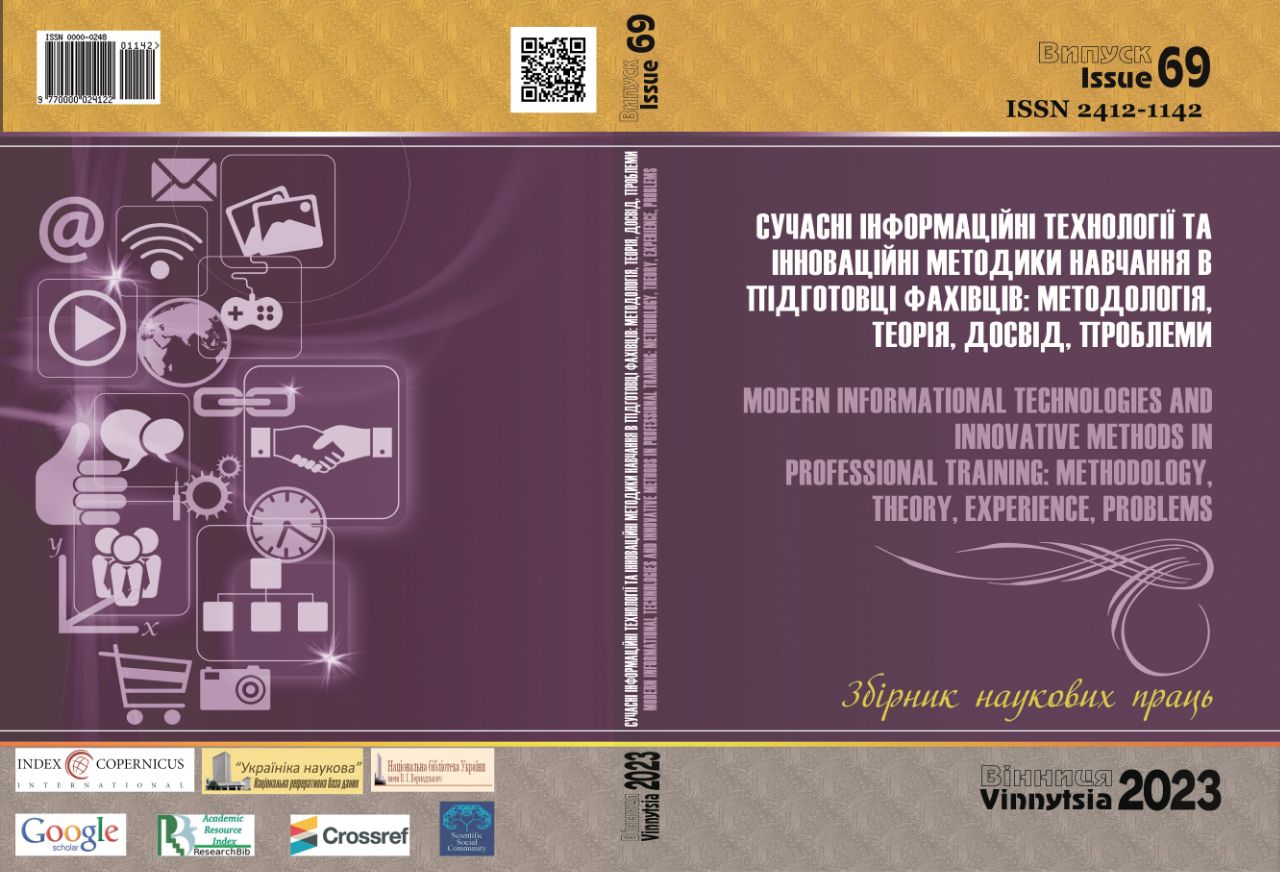APPLICATION OF GAMING TECHNOLOGIES IN THE PROCESS OF TRAINING OF FUTURE TEACHERS FOR PROFESSIONAL ACTIVITIES
DOI:
https://doi.org/10.31652/2412-1142-2023-69-43-55Keywords:
information communication technologies; gaming technologies; computer didactic games; future teachers; creative thinkingAbstract
The article deals with the methods of improvement of future teachers’ training for the application of information communication technologies in their prospective professional activities via gaming technologies. Innovations introduced in the education process of comprehensive and higher educational establishments are analyzed, attention is concentrated on students’ professional development which is considerably connected with the development of their creative potential. The authors analyze the features of the use of gaming technologies that make education process more interesting and effective. The main approaches to the use of game technologies in the education process are treated and specific methods and examples of their use in the training of future teachers are described. The authors consider the role of gaming technologies and highlight their positive impact on students' motivation to study. As a result of the experiment, the general level of computer literacy of the students increased, along with a significant improvement in their creative thinking. The gaming programs created by them become a product of their own transformative activities contain a pronounced creative component. It was proved that computer didactic games having become a way of dream work and imagination developed intuition, promoted creative thinking, contributed to searching non-standard solutions to solve cognitive problems as introduction of gaming technologies is one of the ways to cope successfully with creative assignments by students. Overall, the article provides important information for educators who train future teachers and other professionals in the field of education who take interest in using game technologies. The authors prove that the use of these technologies can make learning more available and comprehensive in the process of future teachers’ training for professional activities.
Downloads
References
Saez-Lopez, H.-M., & Roman-Gonzalez, M. (2015). Gamification as a methodology for cognitive and emotional
learning: a systematic review of education research. Journal of Educational Technology & Society, 18(3), 75-88.
doi: 10.1007/s12528-019-09202-w.
Жалдак М.І. Комп’ютер на уроках математики. Посіб. для вчителів. Техніка, 1997. 303 с.
Гуревич Р. С. Теорія і практика навчання в професійно-технічних закладах : монографія. ДОВ «Вінниця»,
410 с.
Yang H. and Chen K.-M. (2018). The Impact of Gamification on Teaching and Learning: A Systematic Review
of Empirical Research. Educational Research Review. 25, 1-24. doi: 10.1016/j.edurev.2018.08.001.
Duran-Rosal, A., Garrido-Moreno, A., & Rivera-Lopez, E. (2021). Using a gamification platform to teach
programming concepts to engineering students. Computers and Education, 161, 104120.
https://doi.org/10.1016/j.compedu.2020.104120.
Seiler, M., Hance, Y., Mayr, S. K., & Mandl, H. (2017). How gamification motivates: An experimental study of
the effects of specific game design elements on psychological need satisfaction. 69, 371-380.
https://doi.org/10.1016/j.chb.2016.12.033.
Ugur, E., Ozden, M.Y. (2021). Analysis of the impact of gamification on academic success and motivation of students in learning programming. Education and Information Technology. 26(3), 2581-2601. https://doi.org/10.1007/s10639-021-10543-7.
Wang, R., Chen, F., Li, X., & Liang, J. (2021). Review of research on the use of educational games in the
teaching of computer science. Computers and Education, 163, 104124.
https://doi.org/10.1016/j.compedu.2021.104124.
Кириленко Н.М. Педагогічні умови застосування комп'ютерних дидактичних ігор у фаховій підготовці
майбутніх учителів математики й інформатики: дис... канд. пед. наук, 13.00. 04-теорія і методика
професійної освіти. ВДПУ, 2010. 253 c.
Выготский Л. С. Лекции по психологи. СПб., 1997. 144 с.
Педагогічні технології у неперервній педагогічній освіті : монографія / За ред. С. О. Сисоєвої. К. :
ВІПОЛ, 2001. 502 с.
Скрипченко О. В., Волинська Л. В. , Огороднійчук З. В. Вікова та педагогічна психологія: навч. посіб. К.:
Просвіта, 2001. 416 с.
Тихомиров О. К. Анализ этапов компьютеризированной психодиагностики Вопросы психологии. 1990.
№ 2. С. 136–143.
Соловейчик С. П. Учение с увлечением. Дет. лит., 1976. 175 с.
Теплов Б. М. Избранные труды в 2-х т. Педагогика, 1985. Т. 1. 328 с.
Смалько О. А. Розвиток творчого мислення старшокласників на уроках математики з використанням
інформаційних технологій навчання: дис... канд. пед. наук: 13.00.02. К, 2003. 252 с.
Яковишин П. А. Впровадження теорії розв’язування винахідницьких завдань у навчальний процес.
Матеріали звітної наукової конференції викладачів, аспірантів, здобувачів, студентів «Актуальні
проблеми трудової і професійної освіти молоді». Вип. 3. Вінниця : ВДПІ, 1997. С. 66–67.
Сисоєва С. О. Теоретичні і методичні основи підготовки вчителя до формування творчої особистості
учня: дис… док. пед. наук: 13.00.04. К., 1997. 526 с.
Losyeva, Nataliya M.; Kyrylenko, Nelya M.; Kyrylenko, Valerii V.; Kryzhanovskyi, Andrii I. Information
competence as a basis for students’ self-realization: practical experience. Information Technologies and Learning
Tools. 2021. №4(84). P.65-79. URL: https://journal.iitta.gov.ua/index.php/itlt/article/view/3496.
Downloads
Published
Issue
Section
License
Copyright (c) 2023 Кириленко Валерій Вадимович, Кириленко Неля Михайлівна, Крижановський Андрій Іванович

This work is licensed under a Creative Commons Attribution 4.0 International License.





